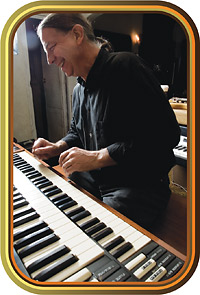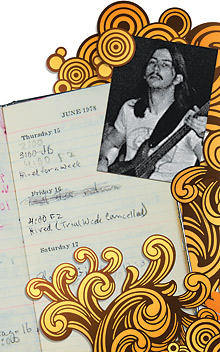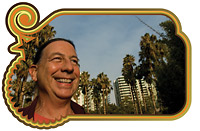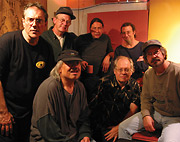 |
|||||||||||||||||

Zappa University
|
4 p.m. June 15, 1978. For years, he had been preparing for that moment — deliberately choosing to learn to play the bass guitar, transcribing complex compositions by ear, even moving to Los Angeles — in hopes of auditioning for Frank Zappa's band. "Frank's music was really difficult — like playing Stravinsky rather than Chuck Berry," Barrow says. On that June afternoon in 1978, Barrow got the break he'd been hoping for. Miles who? His story began in San Antonio, where he took piano lessons and got his first electric guitar in eighth grade. Lured by the synthesizers in North Texas' electronic music labs, Barrow enrolled at North Texas in the fall of 1971. He auditioned for Dale Peters, now a Professor Emeritus, and was accepted as an organ student. But upon his arrival at the university, he learned that only composition majors were allowed to use the labs. So, he changed his major. At North Texas, he was immersed in the musical worlds of Karlheinz Stockhausen, John Coltrane, Béla Bartók and other composers he'd never before heard. "I remember being in the cafeteria at Clark Hall, and some jazz guys were there and talking about Miles this and Miles that," he says. "I had never even heard of Miles Davis. I thought they must be talking about (drummer) Buddy Miles. It was all new to me, and the jazz world was sort of opening up." But he had seen Zappa perform in San Antonio in 1970 and again while he was a student at North Texas. "I was amazed that a rock band could play with that kind of precision," Barrow says. "I would say, 'No human being ever could actually play these parts live.' And then they did, and they'd play the heck out of them." Barrow thought he could never match Zappa's guitarist (usually Zappa himself) or keyboardist George Duke. But he thought he might be able to pull off the bass guitar, so he taught himself to play. In 1975, after graduating with a bachelor of music degree, he packed his belongings into his 1963 green Dodge and headed to Los Angeles, hoping to somehow land in Zappa's band. 'Pancake Breakfast' In the summer of 1978, Barrow was playing top 40 hits at Disneyland when a friend told him Zappa was looking for a new drummer and bass player.
Barrow called Zappa and told him he had learned the difficult 16th-note melody of "Inca Roads" by ear. He remembers that Zappa delivered a challenge: "Do you know 'St. Alfonzo's Pancake Breakfast?' Learn that by ear and play it at your audition the day after tomorrow." With only two days to prepare for the complicated part, Barrow transcribed the melody and played it for Zappa at the audition. Zappa asked him to return the next day. On the second day, after hearing many other bassists, Zappa invited Barrow to play with the band for a week on a trial basis. When Barrow arrived the third day, Zappa asked him to play from sheet music. "I was never a particularly good sight reader," Barrow says, "but I knew his music so well. I knew how he thought and how he accented notes.
After sight reading, Barrow recalls that Zappa took him aside and told him, "You don't have to wait; I'm going to hire you. You're one of the best bass players I've played with." "I was instantly in a state of ecstasy," Barrow says. Zappa U
He entered what the band members called "Zappa University," where each tour seemed like a semester. Rehearsals began in mid afternoon and lasted eight hours a day, five days a week. Although Barrow still was one of the new members (christened "The Puppies" by Zappa's bodyguard), Zappa soon asked him to run the rehearsals as "Clonemeister." "It was a difficult job because you were in the band, but you had to maintain the authority," says Tommy Mars, a keyboardist who joined Zappa's band in 1977. "Frank picked someone who was musically very together, like a conductor, to micromanage. Artie knew the music solid." As "Clonemeister," Barrow ran rehearsals for the first four hours, and then Zappa took over in the second half. Barrow recorded Zappa's instructions and replayed the tape at home each night to take notes. "There were usually no charts," Barrow says. "He'd say, 'You do this and do that; no, do it four times; no, three times; then four times; and then double time.' If it had been written down, we could have just learned it, but it wouldn't have been near as much fun. That was part of the process — being a vehicle for his creation." Barrow was a "scholar of Frank," says Bruce Fowler, a well-known trombonist and former North Texas student who played in Zappa's band before and after Barrow did. "Zappa music is the most difficult music to play," Fowler says. "It's a combination of 20th-century classical atonal music with pop and jazz harmonies. We just had to rehearse and practice all the time to be able to play it." Calling card The grueling touring schedule took a toll on Barrow. He bowed out of the tours after 1980, opting instead to visit Zappa's house for recording sessions. "Even now, all these years later, it was a really defining part of my life," Barrow says. "It was one of the best musical experiences I've ever had on so many levels, and it's become a fantastic calling card for me."
After leaving Zappa's band, Barrow worked on scores for films such as Scarface and Top Gun, and worked with such well-known artists as Joe Cocker, Diana Ross and Billy Idol. In 1985, he opened a recording studio in Los Angeles, where he works on various projects. He has since composed full-length 90-minute scores for old silent movies, including the Greta Garbo movie The Torrent and Buster Keaton's The Cameraman. "Arthur always has nice, fresh ideas," says friend Robby Krieger, former guitarist for The Doors with whom Barrow is now working on a recording project. "He finds the good part of any kind of music. He's not a musical snob." Krieger calls Barrow's career a Hollywood success story — and a rare one. "It is difficult. It doesn't happen very often," Krieger says. "If you set your mind to something like that, it is very possible. Arthur got his stuff together, he went to North Texas and got his musical chops and learned all of Frank Zappa's material." Barrow says he was lucky. But at the same time, he realizes: "If you don't try, nothing's going to happen. It's going to happen through your own hard work and persistence and never giving up."
|
|||||||||||||||||||
 Arthur Barrow ('75) can pinpoint the moment his career changed.
Arthur Barrow ('75) can pinpoint the moment his career changed.  That was the moment.
That was the moment. "There were some guys like Berklee grads who could blaze through 16th notes and just blow me away, but then they'd see something weird — a five or a seven — and they'd freak. But I just blew through the fives and sevens."
"There were some guys like Berklee grads who could blaze through 16th notes and just blow me away, but then they'd see something weird — a five or a seven — and they'd freak. But I just blew through the fives and sevens."